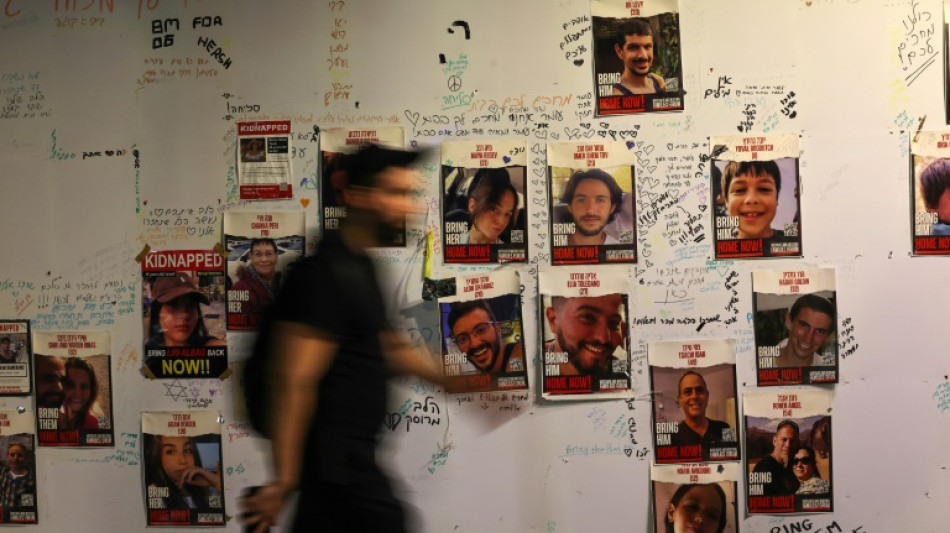

Israel and Hamas agree truce, hostages for prisoners swap
Israel and Hamas said Wednesday they had agreed on a four-day truce in the Gaza war during which the Palestinian militant group would free at least 50 of the hostages they took in their deadly October 7 attack.
In turn, Israel would release at least 150 Palestinian prisoners and allow more humanitarian aid into the coastal territory after more than six weeks of bombardment, heavy fighting and crippling siege.
The hostages to be freed are women and children, and the Palestinian prisoners are women and detainees aged 18 and younger. The process could begin Thursday at 10 am (0800 GMT) according to regional media reports.
The deal -- negotiated with Qatar, the United States and Egypt -- is the first major breakthrough in Gaza's bloodiest ever war that has killed thousands and left much of the territory in ruins.
Although it promises a truce that could be extended if more captives are freed, Israel has vowed to stick to its war aim of destroying Hamas and rescuing all 240 hostages held in the war zone.
"We are very happy that a partial release is pending," Israel's Hostages and Missing Families Forum group said in a statement.
"As of now, we don't know exactly who will be released when."
Prime Minister Benjamin Netanyahu, whose cabinet approved the truce after a marathon overnight session, told his ministers that this was a "difficult decision but it's a right decision".
The cabinet's sign-off was one of the last hurdles after what one US official described as five "extremely excruciating" weeks of talks.
Hamas welcomed the "humanitarian truce" and an official of the Islamist group told AFP that "the resistance is committed to the truce as long as the occupation honours it".
- 'Brave souls' -
The war started after Hamas on October 7 launched the worst attack in Israel's history that left around 1,200 people dead, most of them civilians, according to the Israeli government.
Israel launched a major bombing campaign and then a ground offensive in Gaza which, according to the Hamas government, has killed 14,100 people, thousands of them children.
Israel said that, to facilitate the hostage release, it would initiate a four-day "pause" in its air assault of Gaza.
If the initial phase works, a subsequent phase could see 150 more Palestinian prisoners released in exchange for 50 more hostages, said an Israeli government document naming 300 eligible prisoners.
For every 10 additional hostages released, there would be an extra day's "pause" in fighting, the document said.
Hamas and Islamic Jihad group sources earlier told AFP the truce would apply to ground operations as well as air operations over southern Gaza.
The negotiations have involved the US Central Intelligence Agency, Israel's Mossad, Egyptian intelligence and leaders in Doha, Cairo, Washington, Gaza and Israel.
A senior US official said three Americans, including three-year-old Abigail Mor Idan, were among the 50 earmarked for staggered release from Thursday.
US President Joe Biden said he was "extraordinarily gratified that some of these brave souls... will be reunited with their families once this deal is fully implemented".
- 'Pain in my heart' -
Families on both sides grappled with a lack of clarity over how the releases would unfold.
Israel's list of eligible Palestinian prisoners included 33 women and 123 detainees under 18.
Amani Sarahneh, spokesperson for the Palestinian Prisoners' Club advocacy group, said "we don't know who will be freed first, and that's a problem for us in responding to the families".
Among the Palestinians slated for release is Shrouq Dwayyat, convicted of attempted murder in a 2015 knife attack.
Her mother Sameera Dwayyat said "I had hoped that she would come out in a deal" but added that her relief was tempered by "great pain in my heart" over the dead children in Gaza.
Large parts of Gaza have been flattened by thousands of air strikes, and the territory faces shortages of food, water and fuel.
For now, Israel appeared to be pushing on with its offensive in northern Gaza, with witnesses reporting dawn strikes on Kamal Adwan hospital and nearby homes.
Medical workers treated bloodied, dust-covered survivors as other residents fled through debris-strewn streets to safety.
The Hamas-run government said 200 people had been killed by Israeli forces in the past 24 hours.
"The people are really suffering," Gaza resident Hamza Abdel Razeq said, voicing hope for some respite during a truce: "I believe it will pave the way for longer truces or even a total ceasefire."
- 'Full force' -
The Palestinian Authority in the occupied West Bank also hailed the deal and reiterated its call for "a comprehensive cessation of the Israeli aggression" and more aid deliveries.
Ahead of the Israeli cabinet vote, Netanyahu had faced criticism from within his right-wing coalition, where some argued the deal gave too much to the Palestinian militants.
Hardline Minister for National Security Itamar Ben-Gvir said it should include the release of Israeli soldiers also taken by Hamas.
But with dozens of families in Israel desperate to have their loved ones returned home, and the public gripped by the hostages' fate, the government ultimately set aside any misgivings.
At a Tel Aviv plaza now known as Hostages Square, Doron Klein, 49, told AFP he was "hopeful" child hostages would come home but said the deal could pose "risks" to the military operation.
"I think the fear of everybody is that this will give the Hamas time to reorganise and we'll pay a price with more soldiers that will be killed," he said.
Israel's Defence Minister Yoav Gallant stressed that "immediately after we have exhausted this phase", military operations would "continue in full force".
burs-rcb/fz
M.Vargas--ESF




